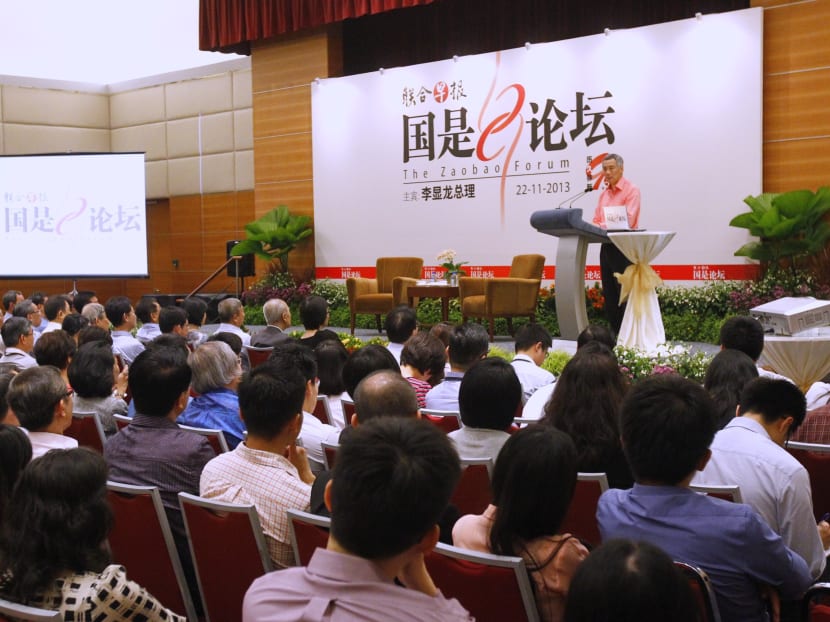New media brings benefits, but downsides need to be tackled: PM
SINGAPORE — New media is now an indispensable part of Singaporean lives, but rules and norms have not caught up with this new reality and more must be done to harness its potential while reducing its downsides, said Prime Minister Lee Hsien Loong last night.
SINGAPORE — New media is now an indispensable part of Singaporean lives, but rules and norms have not caught up with this new reality and more must be done to harness its potential while reducing its downsides, said Prime Minister Lee Hsien Loong last night.
Speaking at a Mandarin forum organised by Lianhe Zaobao last night to celebrate the newspaper’s 90th anniversary, Mr Lee said although new media has brought many benefits — ease of sharing info, connecting with others, coordinating efforts for common causes such as disaster relief efforts — many challenges are thrown up, too.
The recent high-profile cyber attacks against websites here, some of which belong to the Government, are one example of the ugly side of new media. Reiterating that hacking is not just a prank or vandalism, but a serious threat that can cause grave harm, such as through shutting down essential Government services, or paralysing Singapore’s financial system, Mr Lee said in a Mandarin speech the culprits are criminals that need to be fully dealt with under the law.
In the same vein, laws are needed to combat the growing problem of cyber-bullying and other forms of Internet harassment, particularly as the young are especially vulnerable and may end up depressed or suicidal. Then, there is also the phenomenon of trolls setting out just to disrupt proper, constructive discussions by hurling abuse and stirring hate.
“Such behaviour is totally unacceptable face to face, and should be totally unacceptable online too,” he said. “We must fight back against trolling, and provide a safe, responsible online environment which promotes constructive participation.”
“These challenges are not easy to solve. But the new media is already a reality and an indispensable part of our lives,” he added. “We must do more to harness its potential to improve our lives, while reducing its downsides.”
Over time, a framework has to be developed which will take full advantage of the new media, Mr Lee said. This will widen the space for constructive discourse and participation among Singaporeans, allow different perspectives to surface — not just those of a vocal minority — and protect responsible users from those who abuse cyberspace, especially anonymously.
To demonstrate the Government’s will to tackle the problem, Mr Lee said users will need to log in if they want to leave comments on the portal of its feedback arm from the middle of next month. Those who are existing account holders will still be able to log in.
Some websites, such as TODAY’s, YouTube and The New York Times, requires readers to log-in with their Facebook accounts before posting comments. “This has worked well and raised the quality of discussion,” he said.
Some websites have even banned this function altogether despite being from Western countries that place a premium on freedom of expression, he noted.
Mr Lee also noted that social media has caused a “strategic shift” in the media landscape. More diverse choices of news sources or content are now available, while media consumption habits have shifted. For instance, news can spread through friends’ recommendations via social media, and people prefer to read shorter, quicker snippets on platforms like Twitter, instead of lengthy, comprehensive analyses.
Information is also no longer fed to people through traditional mainstream sources. Rather, audiences only turn to what they want to read.
But Mr Lee cautioned that this means that the news that you get first may not always be accurate, and the conclusion one reaches immediately and after considered analyses may also be different. It can also be harder to forge a national consensus with so many small, narrower groups coalescing, he added.
Mr Lee said that individuals too, apart from the Government and the media, must learn to adapt. Individuals, too, must raise their “digital quotient” and learn to synthesize information from a wide range of sources, he added.
Mr Lee said the Government is harmonising its New Media rules with rules for mainstream media. For example, online news sites that exceed a certain readership are required to be licensed under the Broadcasting Act.









